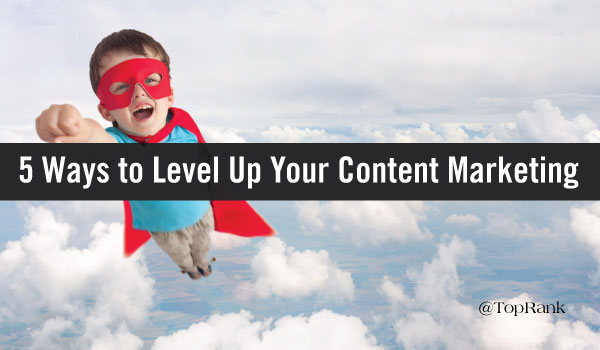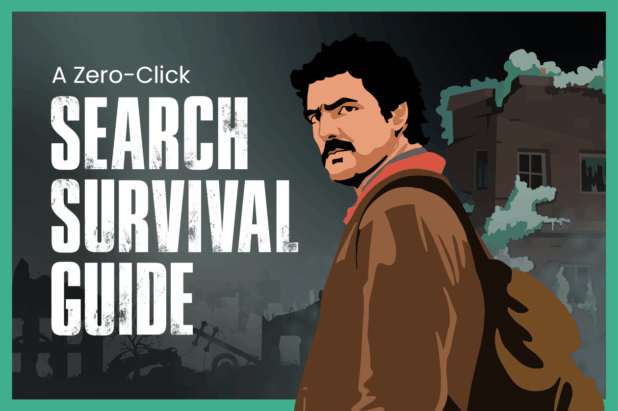
Large or small. Growing or dwindling resources. New or experienced in the content marketing realm. Every organization is at a different stage in their content marketing maturity, looking for innovative and even practical ways to bring their efforts to the next level.
But as the old adage goes, you have to walk before you run—and that couldn’t be more true when it comes to growing your content marketing maturity.
Simply put. In order to grow your content marketing maturity, you have to understand where you’re at and create a strategy to get to the next step.
Using TopRank Marketing’s own content marketing maturity model—developed by CEO Lee Odden—below we offer insights to help you determine your current level of maturity, as well as tips to help you move on to the next.
#1 – Stasis
Stasis is the ground-level of our content marketing maturity model, with marketers focused on maintaining the status quo.
If your organization is at this stage, the content you’re creating is likely necessary or required, and brand-centric. In addition, you’re probably light on resources, so while you may be doing a little experimentation with SEO, blogging or social media, there may not be much cohesion or commitment.
Tip for Leveling Up: Identify key challenges such as department silos or lack of defined processes and resources to get a clear picture of where you’re at and the issues that need to be addressed. Use what you’ve uncovered to reasonably identify and allocate resources, set goals and get your first strategy in place.
#2- Production
If your organization is in the Production stage, you’ve realized that content is a gateway for backlinks, social shares and increased search visibility. As a result, you’re likely focused on creating “more” content that’s guided by an SEO strategy.
At this stage, you probably have some solid, dedicated resources and tools to help generate ideas, and manage, promote and measure results. And—if you’ve done your keyword research—you’ve probably seen some early successes in widening your web footprint, but inquiries may not be rolling in.
Tip for Leveling Up: Craft a content plan that allows you to combine your SEO efforts with specific opportunities to reach your audience at various stages of their buying journey. This will allow you to really dig into your customer’s point of view and pain points, and create content that shows you understand and empathize.
#3 – Utility
If your organization is at the Utility stage, you’ve developed your content marketing programs to go beyond brand-centric and keyword-focused pieces. You’re making a real investment in understanding who your audience is and crafting content that empathizes with them, and contributes to a good user experience.
In addition, you’ve likely defined distinct customer segments, and planning content that aims to provide them with the information they need throughout their purchasing journey. With all the useful content you’re creating, you’re also seeing growth in your social communities.
Tip for Leveling Up: Create more meaningful connections with buyers and your social community by beginning to add an emotional element to your content. In other words, it’s time to go beyond informing your audience about, and help them feel what your brand stands for. In addition, this might be the time to start nurturing your relationships with relevant influencers.
#4 – Storytelling
If your organization is at the Storytelling phase, you’ve come intimately familiar with the questions your audience has during the sales cycle, and you’ve created great content to satisfy their queries. But now you’re evolving your approach to connect with customers on an emotional level—and what better way to do just that than becoming a storyteller?
During your content planning, you’re identifying key brand narratives to enhance your strategy, driving ideas across owned, earned, paid or shared media outlets.
It’s at this stage that being the best answer for your audience becomes a key driver, and you’re integrating content across multiple channels.
Tip for Leveling Up: Continue to refine your content strategy and creation practices to drive continuous improvement, and help keep the standing you’ve worked so hard for. In addition, looks for ways to seize quality and relevant opportunities to help position your brand as a dominant authority in your industry.
#5 – Monetization
All organizations aim to make it to the top of the content maturity model: the Monetization stage. After all, the core function of marketing is to create awareness, educate your audience and eventually inspire action that triggers leads and sales.
At this stage, the content is so good, so incredibly useful and provides such an awesome experience, that it can actually generate revenue on its own through things such as syndication, advertising and sponsorships.
If you’ve made it to this level, I’d like to extend a huge congratulations. Not many make it this far, so kudos.
The Big Takeaway
If your brand doesn’t seem to fit neatly into one of these stages, don’t panic. The model isn’t rigid, but rather it’s meant to help you think about where you are and where you’d like to go so you can craft a content marketing strategy to help you get there.
Where does your organization fit in the content marketing maturity model? What steps are you taking to help you get to the next level?


